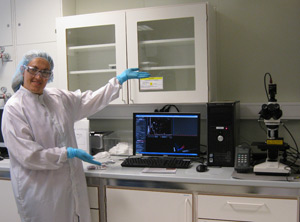Oct 16 2012
NanoSight, leading manufacturers of unique nanoparticle characterization technology, reports on the characterization of nanoparticles at the NanoLab of the Norwegian University of Science & Technology, NTNU.

NTNU NanoLab is a cross faculty, strategic initiative with the objective to coordinate and promote nanoscience and nanotechnology at NTNU. The laboratories are well-equipped with state of the art instrumentation designed to be used by as many researchers from as many disciplines as possible.
For example, Katarzyna Psonka-Antonczyk is a post-doctoral fellow in the Biophysics and Medical Technology group within the Department of Physics. Her interests include the characterization of nanovesicles (exosomes) with sizes ranging from 30 to a few hundred nanometers secreted by cancer cells to the extracellular matrix. Exosomes are intercellular shuttle vehicles of various materials and contain information that can reprogram targeted cells. Exosomes contain membrane proteins, cytosolic proteins and small RNAs (miRNA). These vesicles are transported by bodily fluids (blood) and can likely fuse back with plasma membranes, introducing new proteins and RNA in new cells distant from the cell of origin. She is applying single-molecule techniques like atomic force microscopy and total internal reflection fluorescence microscopy to visualize individual exosomes and to characterize their membrane repertoire.
Knowing the concentration of secreted exosomes can facilitate estimation of the secretory abilities of cells and can help in further sample preparation. When coupled with fluorescent light, the NanoSight Nanoparticle Tracking Analysis system enables the analysis of exosome samples to provide information of various distinct subpopulations of vesicles by labeling with specific antibodies tagged with a fluorescent reporter. In the opinion of Dr Psonka-Antonczyk, the NanoSight LM10 has proven to be a very suitable instrument to access the concentration and size profile of exosomes.
Prior to using NanoSight, Dr Psonka-Antonczyk tried to employ dynamic light scattering but the results were rather irreproducible and not very reliable. In contrast, NanoSight exceeded her expectations. She said "NanoSight's system is simple and easy to operate in providing information on the exosomes concentration and size profile in a very short time. I can also use it as a test measurement providing the first glance on the exosomes before running more elaborate and time-consuming experiments."
The range of applications for NTA at NanoLab is diverse. For example, metallic and magnetic nanoparticles (Chemical Engineering) used for biomedical applications including targeted drug delivery and MRI contrast enhancement are studied by Dr Gurvinder Singh. He likes the NTA approach because "it provides the determination of particle concentration, better resolution of particle size and size distribution with real time visualization. This instrument is more impressive than DLS."
The open approach of NanoLab to encourage users from across the different faculties is illustrated in the way NTNU users may even book time online: http://www.norfab.no/technologies/characterization/ntnu-nanolab/nanosight/.
To find out about the company and to learn more about particle characterization using NanoSight's unique Nanoparticle Tracking Analysis solutions, visit www.nanosight.com and register to receive the next issue of NanoTrail, the company's electronic newsletter.